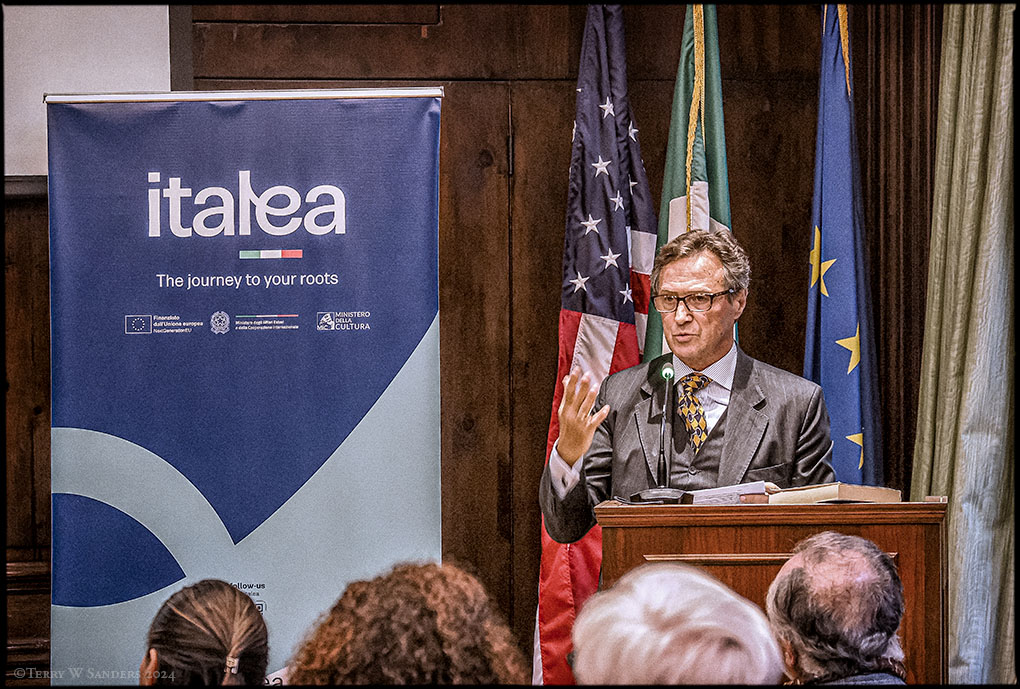Last night, the Italian Cultural Institute hosted an event featuring representatives from five different Italian regions, who are part of a national program to promote roots tourism. The program, called Italea (a porte-manteau of “Italia” and “talea,” the Italian word for tree grafting, in this case a metaphor for emigration), is organized by the Italian Ministry of Culture, the Italian Ministry of Foreign Affairs, and is financed by the European Union. The idea is to attract Italians abroad and Italian-descendants to return to the places of their families’ origins, offering them the opportunity to rediscover their roots and engage with local customs and culture. More importantly, the program also provides participants with access to a network of local historians and genealogists to help them identify their ancestors.
As part of the project, each of Italy’s 20 regions controls its own Italea program with relative autonomy, in charge of welcoming, informing, and assisting travelers taking part in it. Each region’s Italea page can be reached from the umbrella page italea.com. The ICI’s event last night was a mini-film festival of sorts for the overall project, with representatives from five regions –Puglia, Lazio, Liguria, Calabria, and Piemonte – screening promotional shorts for their respective programs, each one a window into the region’s self-image.

Piemonte and Liguria’s films play on northern Italy’s industrial and entrepreneurial history as their big draw. The latter focuses entirely on the region’s most famous fruit of its emigrants: Amadeo Peter Giannini, the founder of the Bank of Italy, which went on to become Bank of America. The film charts his life story, detailing his humble beginnings as a child of Ligurian parents in late 19th-century California. We learn of his father’s violent death when he was 7 and the many risks he took with the institution he built later on, financing risky projects across all scales and sectors, from the Golden Gate Bridge to Charlie Chaplin’s early opus “The Boy.” We also receive Giannini’s famous heuristic for who to trust with a loan, as he claimed to examine people’s hands to see if they were worn from work. Giannini’s story is as good a starting point as any to get people interested in their roots abroad.
As for Piemonte, we get a more sleek and stylish product, albeit a conventional one. Even more than Liguria, Piemonte is a linchpin of Italy’s industrial sector (with Torino considered the industrial heart of Italy as the home of FIAT) yet also hosts many treasured sights, art, and traditions. We get a series of quick cuts showcasing all of this – sweeping lake vistas followed by a robotic arm in a factory, a supercar gleaming under spotlights followed by a glass of wine (Barbaresco? Barbera? Barolo?) being poured – all with narration telling us that here, “tradition and modernity blend seamlessly.” While it draws attention and excitement about visiting Piemonte, perhaps the message to find one’s roots there is lost in the literal shuffle of images.

Lazio, the region of Rome, hews close to the assignment, with success, showcasing a small town and featuring people born outside of Italy, but with Italian parentage, who have since returned there to live permanently, drawn to the quasi-meditative calm of Italian small-town life. “There is something of value here that we must not lose,” says a local official. We also get to meet a local historian who guides people in finding their ancestry in the area. As a person of Italian parentage, with only some knowledge of my roots, I was immediately interested.
Calabria goes in an entirely different direction, bringing the viewer on a trip with a beautiful woman down its stunning coast and into its lovely small towns. She drives an Alfa Romeo Spider with the top down at sunset, she dances on tables at a dinner in the town square, she rides a rowboat in the sapphire Tyrrhenian sea flanked by cliffs… if that’s finding your roots then sign me up.
The most ambitious and unexpected film of the bunch is the one for Puglia, whose Italea contingent offers a 30-minute film by Mimmo Mongelli, an independent filmmaker from Bari. The film crosses between narrative and documentary film, as we follow a young Black American woman on a journey through her late father’s land. She seeks a tree where he left a time capsule for her to find, a revelation confessed to her with his last words. She travels with two similarly-aged Apulian hosts, taking her from tree to tree – oaks (“quercia”) and olives (“ulivi”), essential elements of the Apulian landscape – until she finds the right one. Along the way, she is guided, enticed, and pestered by what appear to be folkloric or mythical spirits that only she sees, as her hosts look on in confusion.
She eventually finds the tree her father told her to seek, digs up the time capsule, and releases its contents – grain, which spills into the dirt and, like magic, floats up to blend with the starry sky above our young travelers. A highly conceptual and definitely overwrought piece for tourism promotion – however, undeniably, it is moving. Seeking out one’s ancestral past, at its best, perhaps should be a conversation with cryptic spirits as we try to understand ourselves, and what a beautiful thing it is to liberate long dormant possibilities of growth.











